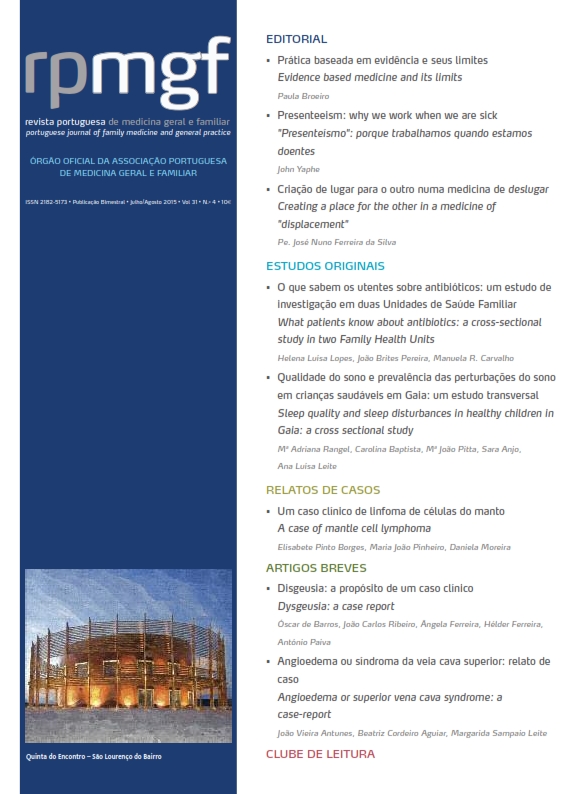What patients know about antibiotics: a cross-sectional study in two Family Health Units
DOI:
https://doi.org/10.32385/rpmgf.v31i4.11552Keywords:
Antibiotics, Knowledge, PatientsAbstract
Objectives: To assess patient knowledge about antibiotic use in two Family Health Units (FHU). Type of study: Cross-sectional study. Setting: FHU das Conchas and Ars Médica. Participants: Registered patients in the FHU das Conchas and Ars Médica 18 years of age or older. Methods: An anonymous questionnaire was administered to a sample of 380 patients. We collected data on age, gender, education, nationality, children under 18 years, knowledge about the use of antibiotics, and their use without prescription. Results: Most subjects were female (68.95%), had at least 12 years of education, and were Portuguese. The average age was 46 years. Less than half had children under the age of 18 (42.37%). The majority (65.26%) responded that antibiotics are not intended to treat cough, body aches, sore throat and ‘runny nose’ with a duration of five days, and 63.42% responded that antibiotics are used to treat infections caused by bacteria. Less than half (48.98%) reported that antibiotics do not help to recover faster from a cold or flu. The majority (67.89%) identified the use of antibiotics as a cause of resistant infections. However, 17.11% had taken antibiotics without a prescription. There was a weak positive correlation between education and the number of correct responses (rs=0.328)). Patients who did not self-medicate had higher knowledge scores (Mann-Whitney p=0.002). Conclusion: These patients demonstrated greater knowledge of antibiotic use compared to previous findings in the Portuguese literature. This may be due to the high level of education in the sample. The prevalence of self-medication was similar to that previously reported in the literature. This study has improved our perception of our patients’ knowledge of antibiotic use, and has drawn attention to the problem of self-medication.Downloads
Downloads
Published
Issue
Section
License
The authors will assign to the RPMGF the sole right to publish and distribute the content of the manuscript specified in this declaration via physical, electronic, broadcasting or any other medium that may come into existence. They also grant the RPMGF the right to use and exploit this manuscript, in particular by assigning, selling or licensing its content. This permission is permanent and takes effect from the moment the manuscript is submitted, has the maximum duration allowed by applicable Portuguese or international law and is of worldwide scope. The authors further declare that this assignment is made free of charge. If the RPMGF informs the authors that it is not going to publish their manuscript, the exclusive assignment of rights ceases forthwith.
The authors authorise the RPMGF (or any entity it may appoint) to act on their behalf when it believes that copyright may have been infringed.





